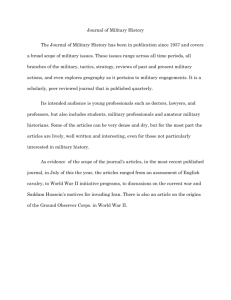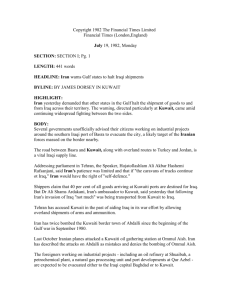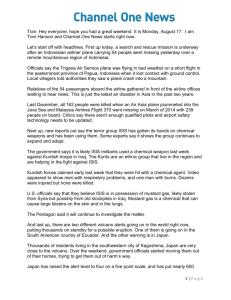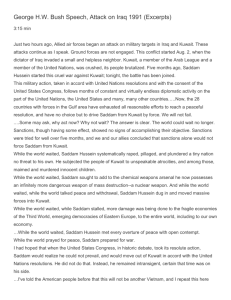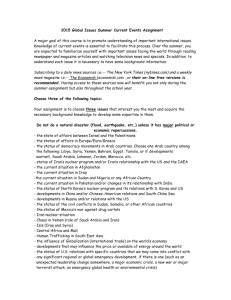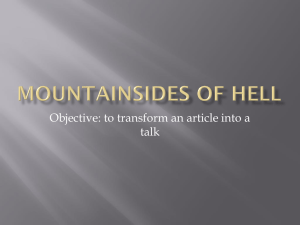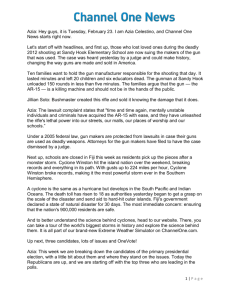January 19, 2016 (DOC)
advertisement
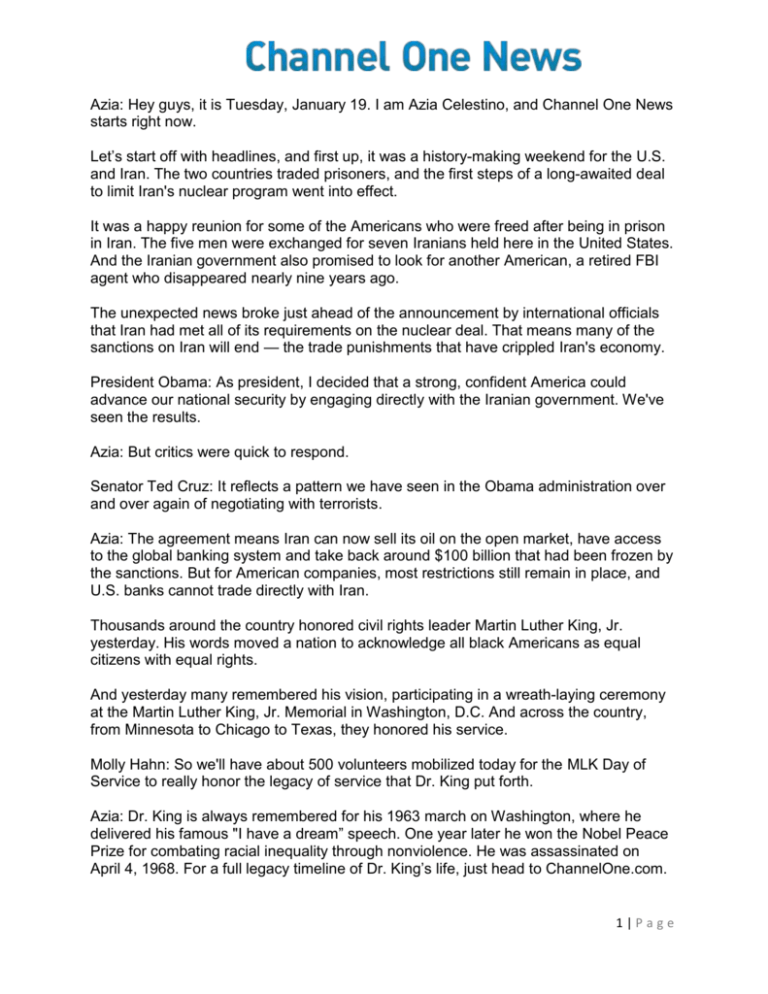
Azia: Hey guys, it is Tuesday, January 19. I am Azia Celestino, and Channel One News starts right now. Let’s start off with headlines, and first up, it was a history-making weekend for the U.S. and Iran. The two countries traded prisoners, and the first steps of a long-awaited deal to limit Iran's nuclear program went into effect. It was a happy reunion for some of the Americans who were freed after being in prison in Iran. The five men were exchanged for seven Iranians held here in the United States. And the Iranian government also promised to look for another American, a retired FBI agent who disappeared nearly nine years ago. The unexpected news broke just ahead of the announcement by international officials that Iran had met all of its requirements on the nuclear deal. That means many of the sanctions on Iran will end — the trade punishments that have crippled Iran's economy. President Obama: As president, I decided that a strong, confident America could advance our national security by engaging directly with the Iranian government. We've seen the results. Azia: But critics were quick to respond. Senator Ted Cruz: It reflects a pattern we have seen in the Obama administration over and over again of negotiating with terrorists. Azia: The agreement means Iran can now sell its oil on the open market, have access to the global banking system and take back around $100 billion that had been frozen by the sanctions. But for American companies, most restrictions still remain in place, and U.S. banks cannot trade directly with Iran. Thousands around the country honored civil rights leader Martin Luther King, Jr. yesterday. His words moved a nation to acknowledge all black Americans as equal citizens with equal rights. And yesterday many remembered his vision, participating in a wreath-laying ceremony at the Martin Luther King, Jr. Memorial in Washington, D.C. And across the country, from Minnesota to Chicago to Texas, they honored his service. Molly Hahn: So we'll have about 500 volunteers mobilized today for the MLK Day of Service to really honor the legacy of service that Dr. King put forth. Azia: Dr. King is always remembered for his 1963 march on Washington, where he delivered his famous "I have a dream” speech. One year later he won the Nobel Peace Prize for combating racial inequality through nonviolence. He was assassinated on April 4, 1968. For a full legacy timeline of Dr. King’s life, just head to ChannelOne.com. 1|Page All right, after the break we are putting your history skills to the test. Azia: This week marks an important milestone in U.S. history and our relationship with the Middle East. Tom: Yeah, Azia; 25 years ago, in 1991, was the start of the First Gulf War, also known as Operation Desert Storm. The U.S., leading dozens of other nations, invaded the country of Iraq after its leader tried to take over neighboring Kuwait. So here is your question: who was the leader of Iraq during the First Gulf War? Was it a. Saddam Hussein b. Osama bin Laden c. Bashar al-Assad or d. Ayatollah Khomeini? Take 10 seconds. Okay, the answer is a, Saddam Hussein. Considered a brutal dictator, Saddam Hussein became president of Iraq in 1979. In August of 1990, Hussein sent Iraqi troops into Kuwait, an oil-rich country and important shipping hub. The U.S. and the United Nations believed he was trying to take control of the country. President Bush: This will not stand, this aggression against Kuwait. Tom: When negotiations didn't work, President George H. W. Bush ordered the military to bomb Iraqi targets on January 17, 1991, and send 500,000 troops into Iraq. General Colin Powell: I was able to guarantee President Bush that we would succeed because the Iraqi Army was sitting there in Kuwait like a golf ball on top of the tee waiting to be hit. Tom: Colin Powell was chairman of the Joint Chiefs of Staff at the time and described the war plan in simple terms. General Powell: Our strategy to go after this army is very, very simple. First, we are going to cut it off, and then we are going to kill it. Tom: And the U.S. did just that. The Gulf War lasted only six weeks, until February 28, 1991, when Saddam's troops left Kuwait. It cost the U.S. about $61 billion; nearly 400 Americans were killed; 100,000 Iraqi troops were killed as well. 2|Page But the First Gulf War was groundbreaking in many ways. It was the first time that Americans could watch a war on live TV, with reporters broadcasting as bombs were coming down. And it set the stage for the second war with Iraq. General Powell: We had hoped that after Desert Storm, Saddam would be so weakened that he would be taken down or he would quit. That didn't happen, and that was a great disappointment to President Bush. Tom: In 2003 the U.S. once again invaded Iraq, this time toppling Saddam Hussein and taking him out of power. The U.S. declared the end of the Iraq War in 2011, but since then Iraq has struggled to create a secure and stable country. The terror group ISIS formed in Iraq, eventually expanding its reach into neighboring Syria and spreading its message of terror around the world. Tom Hanson, Channel One News. Azia: Okay guys, coming up: it is high school graduation, boot-camp style. Azia: Last year we introduced you to a group of students who weren't making the cut in high school but got a second chance at the Challenge Academy, a boot-camp style school that takes failing grades and bad attitudes and turns them into A+ students. Now Arielle Hixson is checking back in with those students to see the next chapter of their lives. Arielle: A lot has changed for 18-year old Adjekai Stewart since her first days at Sunburst Youth Challenge Academy. She and 200 other rebellious, unfocused high school dropouts were getting a wake-up call like none they had ever heard. For five and a half months, they went through a dramatic transformation, both physically and emotionally. Like Adjekai, who spent 10 minutes high up on this confidence-building course before she was convinced to take a leap of faith. Adjekai Stewart: I felt like I was such a weak person back then. Arielle: Now, she is a first-semester college student. She graduated Challenge Academy and then finished high school. Adjekai: I cried the next day because I was, like, “Wow, like, I actually finished. I actually graduated!” so it was really cool. Arielle: Seventeen-year-old Parker Coker is almost finished with the program too. Back at Sunburst he was training himself to build strength for his future. Parker Coker: You gotta look ahead, and it’s not really easy to look ahead when you don’t know how to, when nobody's really taught you how to. 3|Page Arielle: He will graduate high school next year and plans to join the army. If not for Sunburst, he might have ended up in a very different place. Parker: Probably in juvenile hall. Yeah. Arielle: Many of the cadets from Sunburst have accomplished a lot since their tough days in boot camp. Edward Tucker graduated high school last December, and Christa Hopkins and Francisco Lazo are on track to get their diplomas next year. Angel Kay LeMaster dived right into her post-Sunburst life and plans to try out for the swim team at Rubidoux High School. Angel could barely hold it together during her first few days at Sunburst, but if you listen to her story, you can understand why. Angel Kay LeMaster: Me and my mom were homeless pretty much, sleeping in cars, underneath freeways. I was always on my own, couch-hopping my entire teenage life, which caused me to drop out. Arielle: Now, she is focused on the future because she understands her past. Angel: I messed my life up, you know. And it's hard to sit there and think that I messed my life up so bad that I needed to go to Sunburst in the first place, but it was an opportunity to open myself up and have a fresh start, a better chance. Azia: Okay guys, that is all for now. But have a great day, and we will see you right back here tomorrow. 4|Page


